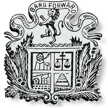August 27, 2025 |
The following article was published by Eddie McRorie in December 2020 on the Johnstone History Facebook page and is reproduced here with his kind permission.
David Wylie – “The Father of the Press” in Canada
Biography of Lieutenant-Colonel David Wylie
David Wylie, often called
“the father of the Press”
in Canada, was a journalist of both great experience and ability. He was the son
of William and Mary (Orr) Wylie, who were married in Johnstone, Renfrewshire,
Scotland, in 1804. They raised five children, with David being the fourth. Two
of his brothers went to sea and became captains, one of them serving with the
Inman Line of steamers.
David was born in Johnstone, parish of Paisley, on March 23, 1811. His father
was a shoe dealer with a love of books, and he encouraged young David to read
widely. This early influence set him on a lifelong path in literature and
journalism.
In 1819, David’s father emigrated to Montreal, but sadly died before he was able
to bring over his wife and children. His mother was left to raise the family on
her own.
At age fourteen, David was apprenticed to a printer for seven years. The last
half of his apprenticeship was spent at the University Printing Office in
Glasgow, where he also took lessons in Latin, French, and stenography.
After finishing his apprenticeship, Wylie spent three
or four years at the Greenock Advertiser,
writing newspaper items and short stories. He later worked for the
Glasgow Guardian,
and then moved to Liverpool where he served for eight years as reporter and
proofreader for the Mail.
While in Liverpool, he joined the Oddfellows Lodge and became active in the
Manchester Unity of Oddfellows.
From there, he went to Manchester to work on the
Anti-Corn-Law Circular,
the voice of Richard Cobden, John Bright, and other reform leaders. When the
publication later moved to London, Wylie returned to Scotland to take charge of
the Fife Herald
office in Cupar. During this time he published a story called
Life of a Convict,
as well as several poems in the Herald.
In 1845, Wylie was invited by John C. Becket of
Montreal to come to Canada and manage his printing office, which published
several monthly periodicals. Wylie accepted, arriving in September of that year.
He quickly became involved in the debate on “Responsible Government,” writing
letters back to the Fife Herald
strongly supporting it.
He also continued his Oddfellows membership in Montreal and was later elected
Grand Master of the Order in Canada.
In 1849, Wylie left Becket’s office to become a
parliamentary reporter for the Montreal Herald.
He also wrote for other Montreal papers and contributed to the monthly
Literary Garland.
When the Parliament buildings in Montreal were burned in 1849, Wylie covered the
debates for the Herald,
producing eighteen columns of reporting—work so well received that members of
the House voted him a $50 bonus.
Later that year, Wylie moved to Brockville to take
charge of the Recorder.
He made the paper a strong Reform voice, arguing for more freedoms for the
people and fewer powers for the Crown. His radicalism was shaped by what he had
witnessed growing up in Britain, where government repression was harsh, and
dissenters were often imprisoned or forced into exile.
For nearly thirty years, Wylie published the
Brockville Recorder.
In its last three years under his ownership, he issued both daily and weekly
editions. He sold the paper in September 1875.
In 1867, he published a collection of poems titled
Waifs from the Thousand Isles,
which received warm reviews. In 1870, he returned to Scotland on behalf of the
Provincial Government to promote Canada as a destination for immigrants. He
covered his own time and only had expenses reimbursed, spending four months
speaking and writing about Canada, including a series of letters for the
Glasgow Herald.
Wylie was also active in the militia, beginning as a rifle company volunteer in
Montreal. He rose through the ranks to become Lieutenant-Colonel and Paymaster
of Militia District No. 4.
In education, Wylie served on the School Board in Brockville from 1849 onward,
and for nearly twenty years acted as its chairman. He was deeply committed to
improving education in his community.
A Presbyterian, Wylie served as an elder while in Montreal and maintained a
strong Christian character throughout his life. He was known as an excellent
conversationalist, a man of broad knowledge, and a lively participant in social
circles.
Wylie married twice. His first wife was Janet McNab of Glasgow, whom he married
in 1834. She died in 1865, along with their only daughter, Christina, who passed
away at age 23. Later that year, he married Sophronia Craig, daughter of James
Holden of Augusta, Grenville. Together they had a son and a daughter. Sophronia
outlived him, passing away in 1912.



